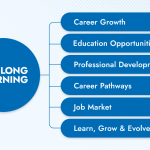Networking is not about just connecting people. It’s about connecting people with people, people with ideas, and people with opportunities.
– Michele Jennae
The Importance of Networking
Networking is a crucial element in career development and personal growth and excels the mere act of meeting people. At its core, effective networking is about forging meaningful relationships that can lead to mutual support, knowledge exchange, and collaborative opportunities. By connecting with others, individuals can access a wealth of information, gain new perspectives, and find inspiration that may not be readily available within their immediate circle. This exchange of ideas and resources can drive innovation, foster creativity, and facilitate personal and professional growth.
Moreover, networking plays a significant role in career advancement. In many industries, job opportunities and career progress often arise through connections and referrals rather than formal applications alone. Building a robust professional network can open doors to hidden job markets, where positions are filled based on recommendations and insider information. Networking can also help individuals stay informed about industry trends, emerging opportunities, and the skills in demand, thereby enhancing their career prospects and keeping them competitive in the job market.
Beyond professional gains, career networking contributes to personal development by building a support system of like-minded individuals. These connections can provide mentorship, guidance, and emotional support, which are invaluable during career advancement or challenging times. Through networking, individuals can also develop essential soft skills such as communication, negotiation, and leadership. Overall, networking is a multifaceted tool that connects people with people, ideas, and opportunities, enriching both their personal and professional lives.
The Role of Networking in Career Advancement
In today’s competitive job market, securing career growth requires more than talent and qualifications. Networking, the art of building professional relationships, is important in shaping one’s career trajectory. This blog explores the significance of career networking in career growth, emphasizing its impact on opportunities, growth, and success.
Career networking refers to establishing and nurturing connections with individuals within one’s industry or field. It serves as a valuable tool for both job seekers and professionals aiming for advancement. By expanding one’s professional network, individuals gain access to multiple opportunities, including job openings, mentorship, and career advice.
Networking facilitates the exchange of information, ideas, and resources, fostering professional development and growth. It allows individuals to tap into hidden job markets, where many positions are filled through referrals and recommendations. Moreover, networking provides a platform for showcasing one’s skills and expertise, enhancing visibility and credibility within the industry.
Building Meaningful Connections
Effective networking goes beyond collecting business cards or adding connections on social media platforms. It involves building meaningful relationships based on mutual trust, respect, and shared interests. Networking events, industry conferences, and online communities serve as avenues for connecting with like-minded professionals and potential mentors.
Networking is not only about self-promotion but also about offering support and assistance to others. By offering help and expertise, individuals can strengthen their professional reputation and expand their network organically. Moreover, maintaining regular communication with contacts ensures that relationships remain active and relevant over time.
Utilizing Networking for Career Advancement
Career networking plays a crucial role in advancement at every stage of one’s professional journey. For job seekers, networking can provide insider insights into companies and industries, making the job search more targeted and effective. Additionally, referrals from within one’s network increase the likelihood of landing interviews and job offers.
Once employed, networking continues to be instrumental in career progress. By cultivating relationships with colleagues, industry leaders, and mentors, individuals can gain access to opportunities for skill development, promotions, and career transitions. Networking also facilitates the exchange of ideas and best practices, fostering innovation and continuous learning.
Strategies for Effective Networking
To leverage career networking for career advancement, individuals should adopt strategic approaches according to their goals and preferences. Some effective networking strategies include:
- Attend Industry Events and Conferences: Engage in seminars, workshops, and conferences to meet professionals in your field, gain insights into industry trends, and participate in discussions that can showcase your expertise.
- Join Professional Associations and Online Communities: Become a member of professional organizations and actively participate in online forums and communities relevant to your industry to expand your network and stay informed about industry developments.
- Utilize Social Media Platforms like LinkedIn: Create and maintain a professional LinkedIn profile, connect with peers and industry influencers, and actively share and comment on industry-related content to build your online presence.
- Participate in Informational Interviews: Reach out to professionals in roles or companies of interest to gain firsthand knowledge and advice, which can help you make informed career decisions and expand your network.
- Offer Assistance and Support to Others: Build rapport and goodwill by providing help, sharing resources, and offering support to others within your network. This can strengthen relationships and foster long-term connections.
- Attend Networking Meetups and Socials: Join local networking meetups or social events where you can meet like-minded professionals in a more casual setting, fostering organic connections.
- Leverage Alumni Networks: Connect with alumni from your educational institutions who work in your industry or desired roles. Alumni networks can provide a valuable source of mentorship and job leads.
- Follow Up and Stay in Touch: After meeting new contacts, follow up with a thank-you note or email, and maintain regular communication to keep the relationship active and beneficial.
- Develop a Networking Plan: Set specific goals for your networking efforts, such as the number of events to attend or new contacts to make each month, to ensure you remain proactive and focused.
- Be Genuine and Authentic: Approach networking with a genuine interest in others and a willingness to build authentic relationships, rather than just seeking personal gain. This sincerity fosters trust and meaningful connections.
- Seek Out Mentorship Opportunities: Identify potential mentors within your network who can provide guidance, support, and insights based on their experience, helping you navigate your career path more effectively.
- Attend Webinars and Online Workshops: Participate in virtual learning opportunities to connect with industry experts and peers from around the world, expanding your network beyond geographical limitations.
- Engage in Volunteering and Community Service: Volunteer for professional organizations or community projects to meet new people, demonstrate your skills, and enhance your professional reputation.
Conclusion
Career networking plays an important role in career development by providing access to opportunities, fostering professional relationships, and facilitating continuous growth and learning. By investing time and effort into building and nurturing their professional network, individuals can enhance their chances of success and fulfillment in their careers. Embracing networking as a strategic tool empowers individuals to proactively manage their career trajectories and seize new opportunities for advancement. Through these connections, professionals can gain insights into industry trends, discover hidden job markets, and receive valuable advice and mentorship from experienced colleagues. This proactive approach not only helps in career progression but also in maintaining a competitive edge in a constantly evolving job market.
For career counsellors looking to magnify their skills and enhance their career counselling methods, the Global Career Counselling program by Univariety, in collaboration with UCLA Extension, offers an excellent opportunity. This program is specifically designed to provide counsellors with advanced knowledge and practical tools to better assist their clients in navigating their career paths. By participating in such programs, counsellors can deepen their understanding of global career trends, improve their networking skills, and connect with other professionals in the field. This enhanced skill set not only benefits their professional growth but also significantly impacts the success of the individuals they guide. The Global Career Counselling program exemplifies how continuous learning and strategic networking can collectively advance careers and professional practices in meaningful ways.
Sukriti is a Hyderabad-based Writer, covering the exciting world of Career Counselling and Entrepreneurship. She also writes about mega-trends in education, diversification for Teachers & other individuals with a focus on how innovation and upskilling can help them grow professionally. She is an MBA in Public Relations & Event Management. When she is not trying to understand complex changes & needs in the counselling and education industry, she enjoys travelling and watching movies with a cup of black ginger tea.













